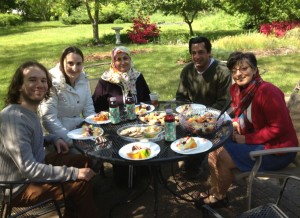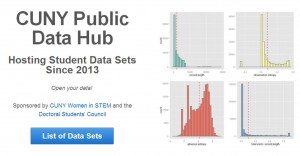- Committee on Women in Science, Engineering, and Medicine:
Since 1990, the National Research Council has hosted the Committee on Women in Science, Engineering, and Medicine (CWSEM), which organizes events dedicated to promoting exactly what the name states. - STEMinist:
Stay on top of news, views, trends, and research about women in STEM through profiles, articles, networking opportunities, and plenty more media. - 4000 Years of Women in Science Biography Listing:
University of Alabama provides a plethora of capsule biographies of some important women in STEM history, so stop by and pay respects to the groundbreakers who made today’s opportunities possible. - Association for Women in Science:
AWIS partners with other organizations and businesses in order to address issues of women working in the STEM fields and keep young girls interested in studying the related subjects. - STEM Equity Pipeline:
Women and minorities are incredibly underrepresented in the STEM fields, and this partnership between the National Advisory Board, Extension Services, and multiple local and national organizations and businesses hopes to change that unfortunate reality permanently. - Association for Women in Mathematics:
This organization’s goals revolve around encouraging young girls to pursue mathematical studies if they enjoy them, as well as promoting the efforts of novice and established women with careers in the field. - Digital Sisters/Sistas Inc.:
For women in the STEM industries interested in education, Digital Sisters/Sistas is a great nonprofit reaching out to “traditionally underserved” child and adult students. - National Center for Women & Information Technology:
Whether an established career woman or an activist and educator looking to nurture a love ofIT in young girls, the NCWIT makes for a great organization to get involved with and promote workplace diversity. - Women in Astronomy:
Head to the Women in Astronomy blog for updated news and commentary about issues pertaining to astronomy, astrophysics, physics, and the ladies who practice them. - Society of Women Engineers:
When it comes to promoting STEM education amongst young girls and college students as well as celebrating the contributions of female engineers, SWE is one of the best resources both online and off. - FemaleScienceProfessor:
Issues pertaining to women in academia and the sciences alike push to the forefront of this popular blog by the anonymous Female Science Professor. - Agora:
Bookmark Agora for multimedia resources regarding the latest women in STEM stories, including the yearly winners of the L’Oreal-UNESCO Awards and information about fellowships.
All posts by Suzanne Tamang
Journal of Interactive Technology and Pedagogy Special Issue: Media and Methods for Opening Education
The Journal of Interactive Technology and Pedagogy
Special Issue: Media and Methods for Opening Education
web link for more information
Deadline for submissions: Oct. 20th
Editors: Gregory T. Donovan and Suzanne Tamang
JITP welcomes work that explores critical and creative uses of interactive technology in teaching, learning, and research. For Issue 5, we are seeking submissions under the theme of “Media and Methods for Opening Education.” This theme invites submissions that critically and creatively consider both media and methods that open up traditional educational settings to more democratic and diverse modes of learning and knowledge production.
We are particularly interested in papers that express intriguing and promising ideas, demonstrate new media forms or educational software tools, or focus on research methods for opening education. Possible submission topics include, but are not limited to:
– The development, implementation, and/or evaluation of pedagogical practices that draw on Open Education Resources (OER).
– Explorations of Open Access, Open Source, and/or Open Data initiatives that address matters of race, class, gender, sexuality, and disability.
– Critical considerations of corporate or proprietary media in pedagogical practices.
– Feminist media and methodologies for challenging patriarchal structures in education.
– Analyses of both the educational media and practices of civic movements such as the Free University, Occupy Data, or CryptoParty.
– Hackathon methodologies: tools and practices.
– Critical and participatory approaches to facilitating MOOCs.
– Engaging local communities in public research and/or education through civic media.
– Interactive platforms and practices that queer traditional educational boundaries between teacher/student as well as inside/outside the classroom, unfixing these binaries so as to reconsider our norms and what they leave unsaid.
– Critical appropriations of queer, feminist and/or radical praxis to address ITP matters such as universal access.
– Visualizing research products for diverse publics.
– Best practices for collaborating in heterogeneous spaces.
– Anti-disciplinary approaches to problem solving and the public domain.
In addition to traditional long-form articles, we invite submissions of audio or visual presentations, interviews, dialogues, or conversations, creative works, manifestos, jeremiads or other scholarly materials. All submissions are subject to an open review process. Submissions received that do not fall under the specific theme of Issue 5, but do fall under the broader theme of JITP, will be considered for publication in a future issue.
**Important Dates**
The submission deadline for the Spring 2014 issue is October 20, 2013. When submitting using our Open Journal Systems software, under “Journal Section,” please select the section titled “Issue 5: Special Issue.” Submission instructions are below.
please contact us with any questions at editors@jitpedagogy.org
Data Anywhere Workshop: open data, Linux admin, NoSQL and more!
Location: CUNY Graduate Center
Time: Sat 10-6pm and Sunday 12-6pm
Room: 5409
**Please be sure you have registered below. The building is open, but we will be in an area that requires you check in with security, and show a valid form of ID**
Data Anywhere Workshop: participants will learn how to configure and secure a UNIX server for hosting open (or private) data sets. Step-by-step instructions will be provided for installing a variety of software packages and participants will become familiar with web applications such as nginx, mongodb, and flask. Also, we’ll be covering a bit of Python, and covering some basics of nosql.
This is an intensive workshop is open to participants of any level, including zero! Most important is the desire to learn. The workshop is open to the CUNY community.
More info on Data Anywhere can be found on occupydatanyc.org
Register by submitting the form here.
Women in STEM 2013 End of Year Celebration
To celebrate the many great achievements of members this year, Annelies, out very kind alumni member hosted a tea party in the lovely Brookhaven, LI.

To receive announcements about events, join us on the GC Commons.
CUNY Women in STEM Data Hub
 CUNY Women in STEM is establishing a CUNY Data Repository that will allow Graduate Center students and affiliates to share data they’ve collected and release it in the public domain. Over the summer we’ll be moving all data sets onto a Data Anywhere server, a project that aims to create a open data commons. Unlike all government and existing open data initiatives, it is a bottom-up approach to an open and participatory data framework.
CUNY Women in STEM is establishing a CUNY Data Repository that will allow Graduate Center students and affiliates to share data they’ve collected and release it in the public domain. Over the summer we’ll be moving all data sets onto a Data Anywhere server, a project that aims to create a open data commons. Unlike all government and existing open data initiatives, it is a bottom-up approach to an open and participatory data framework.
If you have any interest in sharing a data set that you feel will be of use to others, or helping to develop an maintain the site, please let us know.

